#binaries
Text
GUYS ALLAN LITTERALY IS NONBINARY
now I'm not saying he is 100% of a nonbinary gender
but gender and sexuality do not work the same way in barbieland. everyone is either a barbie or a ken— it's a socially constructed binary
that Allan is not part of
77 notes
·
View notes
Text
Lesbinary Pride Flag

Lesbinary or lesbianary (or lesbianry): ascribing binary lesbians.
This includes any lesbian who feel included in the word "binary" in terms of gender, such as those who are aptobinary, bonusbinary, ambinary, yesbinary, bingender, exorgender, wergender, wifgender, binarigender, binary bigender, multibinary, bibinary, binary nonbinary, and so on.
#mogai pride flag#liom#flags#mod ap#binary lesbian#les#lesbinary#lesbinário#lesbinario#lesbinárie#lesbinarie#lésbinária#lesbinária#lesbinaria#lésbinary#lesboy#lesbian woman#binaries#binarie#binario#binaria#gender#genders#gender binary
26 notes
·
View notes
Text
Am I trans?
No. That's the simple answer without explanation. But I want to provide you with some context: Yes, I'm not cis, which technically fits the definition of trans but I'm not trans. Why? Because for me the word trans implies some sort of gender transition, which I do not have. Yes, I'm more or less out in my everyday life as 'nonbinary' (because that's easier to explain to nonqueer folk than my actual labels) but neither did or do I want to change my name nor did I really change my pronouns because although I do have a preference for it/its I'm fine with people using she/her as well. If you're reading this now and think "But that's my experience as well, and I'm trans!" good for you, I'm just talking about my personal identification with the word trans and why I don't identify with it. I am Elsegender, I am Genderfluid, I am Chaosgender, I am Endity, and I am Maverique but I'm neither cis nor trans. I do not fit into binaries of any sort.
12 notes
·
View notes
Text
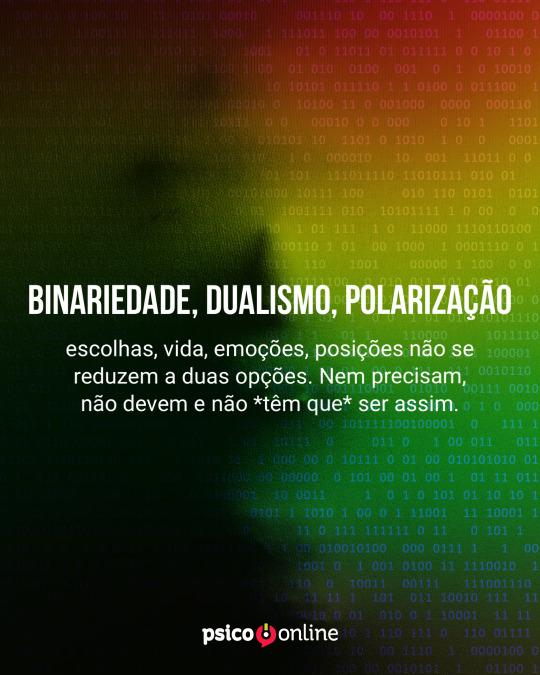
Vivemos numa era marcada pelo dualismo: "sério q vcs gostam de #Barbie? Sério que curtem só o #cult?""Sério que vc é de #esquerda ou de #direita"?
"Vc tem q pensar como eu, isso tá errado"...
Nossa #sociedade, escolhas e, sobretudo, #percepção da realidade parecem cada vez mais regidas pelo #binarismo, pela divisão em 2 categorias #antagônicas.
Mas será q essa é uma representação precisa do mundo?
O #dualismo e a #polarização são #reflexos dos #viesescognitivos, moldados por #condicionamentos #sociais e #temporais, q nos levam a #simplificar o mundo em #categorias #opostas.
Estes vieses são atalhos que economizam energia cognitiva (dão menos trabalho), mas tbém limitam a nossa capacidade de ver as nuances.
Por exp, a falácia do falso dilema nos faz crer q só existem 2 opções em uma situação.
Com isso, excluímos a #possibilidade de existirem múltiplas soluções ou #perspectivas p/ o mesmo problema.
Já a heurística de disponibilidade nos faz dar + importância a informações q estão + facilmente disponíveis para nós, mtas vezes reforçando a visão polarizada do mundo.
Eu faço assim. Eu sou assim.
Por isso, é importante refletir: o qto nossa visão binária é uma simplificação excessiva da complexidade da realidade?
Afinal, nossa existência é permeada por tons de cinza, nuances e complexidades que vão além da dicotomia do preto e branco. Do único modo de ser, fazer, pertencer.
A chave para superar o binarismo é reconhecer sua existência e questionar as dicotomias q surgem em nossas vidas. #Espectros.
Será q estamos nos limitando ao escolher entre 2 extremos?
Estamos ignorando a riqueza e a complexidade do meio?
O diferente é estranho?
Em última análise, a #diversidade da experiência humana ñ se encaixa em caixas binárias.
Precisamos valorizar e abraçar a complexidade e a #multiplicidade das perspectivas, reconhecendo q #escolhas, vida, #emoções, posições não se reduzem a 2 opções.
E a #beleza disso é que nem precisam, ñ devem e não *têm que* ser assim.
Tá travado ou travada nisso?
Vem para #terapia. Vem #conversar sobre outras #possibilidades. Abra-se e tente.. Pq se a gente faz a mesma coisa a #tendência é ter o mesmo resultado, não é?
7 notes
·
View notes
Note
for social change, what's your hottest take?
ohoh this is a fun one.
There's no such thing as a good or bad person. There's just circumstances and choices.
I'd leave it at that but people tend to hear that and think what i mean is that we can't hold people accountable or go "what about <insert historical person here>?"
i'm gonna go into what i mean. read through before you come at me.
If someone's good or bad, that's an innate character judgement. They just... Are. The logical next step of this is to believe that of course they made the choice they did. It couldn't be helped. It also makes it very improbable to make a choice that didn't align with their good/bad category placement, they're just not cut out for that. But that's just now how life works.
Every single "good" person in history has made mistakes, and every single "evil or bad" person in history has some things right. Even on the extremes. We consider them to be good or bad because on average, we as people struggle with nuance, and these individuals, on average made decisions that either significantly bettered or worsened society around them.
These decisions though, weren't because of some innate quality that people had. They were responses to a wealth of factors: what they'd been taught to value, their psychological state, what resources they had, what they knew in the moment, and a bunch of other things. But at the end of the day, they were decisions. They could have chosen not to do that thing, good or bad.
As pedantic as this feels in the abstract, it does have very tangible social change consequences.
As many humans struggle with nuance, many also struggle with accountability. If a person is just a good or bad person, it doesn't matter what's happening in the world around them. But people respond to their circumstances, and those who enable positive choices, and those who enable negative choices are still partially accountable for the outcome of the situation.
Example of this: a kid A gets upset on a playground and lashes out at another kid B, hurting B in the process. We could call A a "bad kid," but if that's how conflict resolution and emotional regulation's being modeled at home, is A really bad? or did they just use the tools at their disposal to the best they knew how? The parents here are partially accountable for A's actions because they enabled that behavior.
What I'm getting at here is that if we stop at calling people good and bad, we're not going to get at the underlying issues that perpetuate problems. In the example, kid A is still going to have to apologize and do what they can to make amends for their actions, they did harm, after all, but unless this knowledge gap is filled by those who can see it needs to be filled, the problem will continue.
That's the circumstances part of "there are just circumstances and choices." The other side is that even a person we see as "good" can do major harm, and a person we see as bad can do major good.
Example of this: if close friend X is always super kind when you're around, and does a lot of good work, maybe volunteers, and then you hear from his son that X is a perpetrator of domestic abuse, does the fact that you see abusers as bad people and X as good mean that X is inherently not perpetrating domestic abuse?
No. The answer here is no.
Another (real) example: if someone radicalizes a lot of people towards a hate group and then gets deradicalized themself and start an organization centered around getting others out, does the fact that they caused part of the problem to begin with mean that what they're doing now doesn't matter because they're already bad?
I would argue no here. It might not undo the problem and collateral damage but it does matter.
What I'm getting at is that people can help people in one area of life and then turn around and hurt others in a different area. If we believe that "good" people are incapable of doing harm, we're going to abandon those who feel the direct brunt of the damage being caused and we'll be afraid to call out the actions taking place, and it will continue to go unchecked. If we believe that "bad" people are incapable of doing good, then we inherently forfeit any battles we fight trying to make positive change. How can a person do better if we lock them into a narrative where their only options are to continue harm?
Similarly, this goes to how we view ourselves. One the one hand, a lot of people who consider themselves to be "good people" have done a lot of harm because of the belief that hurting others makes someone a bad person and they're not a bad person so therefore they could not have done harm - it's the other person's fault, or it wasn't actually hurting someone because there just wasn't another way. Or the other hand, if people consider themselves to be "bad people" then that must mean they're the ones causing the harm, regardless of whether or not they are.
Having this in mind also protects us against scapegoating mentality. What actions are the people we're told are good making? Why are they making them? Likewise, what actions are the people we're told are bad making, and why?
In the end, people are in control of the choices they make. Being kind and compassionate is a choice. So is being violent or destructive. People will always have their reasons because most of us like to see ourselves as the hero of our story, but a choice made is still a choice made. We all have to answer for that.
[and for the people who are picking their worst villain from history and saying what about them? yeah they made horrible choices. but it was in their power to make a different choice. the weren't predestined for badness, they were taught that it was okay (or weren't taught that it wasn't) and chose to do it anyway. they also chose not to right those wrongs. they probably didn't even see themself as anything but a hero, especially since they were kind to at least someone. and that's the dangerous part, because anyone, given the right conditions and resources can go down that path.]
TL;DR, a good and bad binary doesn't reflect reality, it obscures a lot of problems, lets enablers of bad choices get off free and leaves those of good choices in the shadows, makes it harder for people to change for the better, makes it harder to call out when people change for the worse, enables scapegoating, and makes it harder to recognize the agency we have over our own actions and the consequences thereof. That's my hot take.
#hot take#social issues#good people#bad people#binaries#heroes of history#villains of history#tw domestic violence#tw hate group mention#self image#introspection#life lessons#radicalization#deradicalization#nuance#critical thinking#circumstances and choices#agency#morality#right and wrong
5 notes
·
View notes
Text
While hierarchy is about exclusion, festivity generates inclusiveness. The music invites everyone to the dance; shared food briefly undermines the privilege of class. As for masks: They may serve symbolic, ritual functions, but, to the extent that they conceal identity, they also dissolve the difference between stranger and neighbor, making the neighbor temporarily strange and the stranger no more foreign than anyone else. No source of human difference or identity is immune to the carnival challenge; cross-dressers defy gender just as those who costume as priests and kings mock power and rank. At the height of the festivity, we step out of our assigned roles and statuses—of gender, ethnicity, tribe, and rank—and into a brief utopia defined by egalitarianism, creativity, and mutual love. This is how danced rituals and festivities served to bind prehistoric human groups, and this is what still beckons us today.
Barbara Ehrenreich, Dancing in the Streets: A History of Collective Joy
#barbara ehrenreich#dancing in the streets#books#collective effervescence#pleasure#hedonism#carnival#festivals#dancing#binaries
30 notes
·
View notes
Text
For all that humanity professes to delighting in its own sophistication, it longs for simplicity, for when the world can be deboned into binaries: darkness and light, death and life, hunter and hunted.
The Salt Grows Heavy, Cassandra Khaw
2 notes
·
View notes
Text
Clickbait: Terry Gross made fun of someone who cannot hear.
View this post on Instagram
A post shared by G. B. Gabbler 🤖🦶 (@g.b.gabbler)
In response to: Flawed chatbot or threat to society? Both? We explore the risks and benefits of AI
View On WordPress
#2023#AI#Anthropocene#apocalypse#Apollo#Art#artists#Automatons#Avatars#BBtA#binaries#blessed by the algorithm#chatgpt#classical studies#Cults#cyborgs#demigods#Fresh Air#Generative AI#Gods in our Machines#greek myth#Hephaestus#hermes#Magical Realism#NPR#Promethus#roman myth#singularity#Surrealism#Terry Gross
2 notes
·
View notes
Text
CUBLEX'S STEAM DECK RATINGS
A variety of game ratings for games I've tried that Steam currently doesn't have a rating for, and why I chose them
Absconding Zatwor - Playable! You have to hold down the right touchpad and slide your thumb around for movement, and if there's anything else you do I'm unaware of it because this game isn't good
Ascent - Playable! Gameplay is just the D-Pad (perfect!) but menu isn't controller navigatable. Right touchpad works great for this.
Binaries - Verified! It just works. Simple platformer, makes sense.
BIT.TRIP VOID - Unsupported. Crashes on bootup. The other original BIT.TRIPs probably do this too, considering BEAT and RUNNER are Steam classed as Unsupported. Another point for the Vita!
CROSSNIQ+ - Unsupported. Boots into the Unity "select your resolution and quality" thingy, and trying to confirm your options and get to the game doesn't work as for some reason the mouse cursor refuses to go low enough to actually press the confirm button.
Ekstase - Verified! Again, it just works. Menus can be a little odd, but I've been able to navigate with controller only. If it gives you issue, right touchpad's your guy.
Velocibox - Playable! And if you usually play the game on stick anyway, it's Verified! (D-pad doesn't work by default, but you can definitely configure it to do so.)
Vividlope - Playable! ALMOST Verified, but none of the resolution options fit the screen without letterboxing. Everything else is perfect, and I'm not picky, but that's how it is.
You Have 10 Seconds 3 - Verified! Simple game controlwise, so it makes sense.
I'll probably edit/update this post later down the line to add more. Most of these are good games, so I recommend trying em out!
#steam deck#absconding zatwor#ascent#binaries#bit.trip void#ekstase#velocibox#vividlope#you have 10 seconds 3#crossniq+
4 notes
·
View notes
Text
It's funny, I feel like I spent a lot of time pointing out that there's almost always a third path of some kind of balance between two things being treated as a false dichotomy, and I'm just waiting for someone to tell me I'm politically a moderate or centrist.
But I'm not.
Because, at least in the US, "Moderate" and "Centrist" haven't actually described finding the necessary balances on various axes of ethical philosophy in general in a very long time - if they ever did. They're people trying to hold some kind of middle ground between what I find fairly reasonable and compassionate in ideal, if a bit lacking in practice, and what I find downright abhorrent in ideal and cruel in practice.
It's not ethically centered or moderate to try to hold a line between "Everyone is allowed to exist" and "Except those people, who we've decided aren't people". "Everyone is allowed to exist" is already a centered place. Pulling it off center, drawing a line at one ridiculous extreme, and then drawing a line halfway between the two and saying "This is the middle now" isn't ethics. It's barely geometry.
But we don't really get anywhere coherent by turning everything into a false dilemma just so we can demand everyone be "with us or against us" even when that doesn't actually make sense.
Yes, there's no middle ground between "Live or Die" but few things are actually that clear-cut, and it's not actually valid reasoning to try to reduce everything to that for the sake of feeling like we have the moral high ground. We're not solving any practical problems with that shit. We are, at most, soothing our feeling of overwhelm from seeing how big the problems really are.
And they ARE big. Far too big for any one person to solve. Any one person has got to pick their battles, narrow their focus, to be effective. That doesn't mean we as a society have to pick our battles - that's another false dilemma. Nothing gets solved by only one person, so the limits of a single person to solve things are only relevant to that single person. All solutions to big problems are, by definition, group efforts.
So... yeah, being centered is important to me. Being centered in the things that actually fucking matter.
The axes I care about being centered on are things like:
Compassion and Wisdom
Freedom and Equality
Individual and Community
Functional and Ideal
Accommodations and Boundaries
And the distribution of resources and responsibilities.
In all things, moderation - even moderation.
#centered vs. centrism#moderation vs. moderate#binaries#false dilemmas#spectrums#and other political problems#ethical philosophy
2 notes
·
View notes
Text
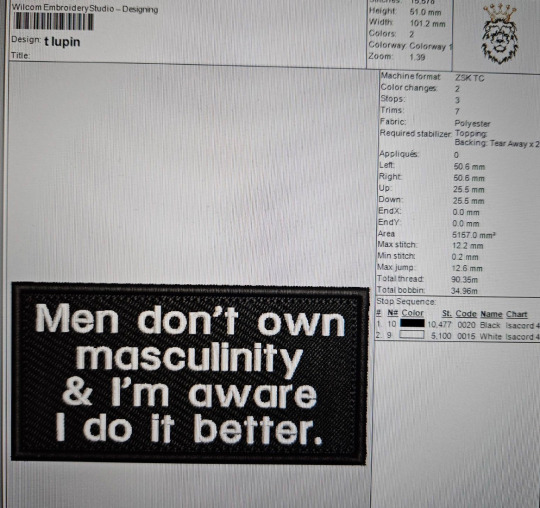
I got a new patch made. What do you think?
I’ve grown to be quite proud of my ancestral roots that lay before and beyond the colonially enforced two-way gender system of European culture. Most cultures have a history of acknowledging masculinity and femininity and focusesed on the connections.
They never had a need for the man woman language that concentrates on segregation/individualism= binary identities.
That’s why it was so easy for them to hold space and hear those who flexed masculinity and femininity in ways the majority may not have. As their perspective was not a limited one, like the two way gender system was built to be. This enabled the ability to see and engage with the entire spectrum.
I’ve learnt first hand how the binary perspective coaxes a dangerous arrogance one of ownership. (As we know this also tends to be patriarchal). To own ones labels and own all others. Whereas the indigenous histories with their perspectives of masculine and feminine energies permit a more symbiotic view rather than individualistic-
you do not own an identity so much as you are part of a certain energy- you occupy a space within a spectrum and as much as you may get to know your own space, there will always be something to learn of all the others. The latter has always made much more instinctual sense to me.
It feels empowering now, and certainly radical, to find ways to display my understanding where it is still mocked as some new meaningless invention. Whilst acknowledging that of all the silenced ancestors who expressed and embodied such knowledge for eons longer, in a world and time that now only acknowledges languages that wrote our ways of being out of any definitions.
#masculine presenting#indigenous#ancestors#binaries#individualism#decolonial#decolonize#decolonise#colonisation#history#black history#poc#butch#dyke#studs#black studs#queer history#transmasc#lesbians#lgbtq#enby#nonbinary#transgender#radical#feminism#mine#my writing#patches#me#my face
6 notes
·
View notes
Text
It's odd that despite the fact I'm definitely genderfluid, I avoid publicly expressing or accepting my feminine moods bc I hate being misgendered so much, even if it wouldn't necessarily be misgendering at the moment.
Like I know a large swath of people on principle don't respect my gender, and only want to see me as a woman (or a man, depending on their initial assumptions. I've had that happen too).
As far as binaries, I'm more comfortable being gendered as a man, but I'm not just a man, and every time someone clearly overwhelmingly thinks of me that way, it's kind of nice because it's not the alternative, but I also find myself trying too hard to shove myself into an uncomfortable box again. I always hate when someone exclusively thinks of me as a woman. It doesn't feel right for me, it doesn't even feel biologically right because I have so many masculine features. It's the kind of thing where you go "i mean, technically yes I have lady genitals, but I also have really high testosterone, can grow facial hair, I have such an irregular and light period that most months I don't even get it, and my general build is more androgynous than one or the other." It's uncomfy to even shove my body into a binary box, even if it technically falls under female. It feels like a technicality. This is 90% of why I don't like talking about my AGAB irl, and the other 10% is because there are fair odds the person who asked is likely to see me as a woman only from there on out. It has been brought up before, but whether I'm intersex or not is a question for a gynecologist, and moving on from biology-
I just feel like I'd be more comfortable expressing all facets and ever-shifting variants of my gender if there weren't expectation-laden binaries attached.
I could be a girl one day and a man the next if people wouldn't just start misgendering me forever as soon as I show a touch too much femininity. I can't be a lady every once and a while because if I do, other people will just run with that. I have to actively struggle to assert that I am not a woman among people who know my AGAB, and I'm not comfortable being thought of as female so long as I know it is the default, or what some people think I "should" be. Because I am not.
#gender#tmi#definitely tmi in the biology discussion lol#but it is relevant and I think when discussing gender that sort of thing is expected#genderfluid#gender presentation#gender expectations#binaries#hal rambles#long post#i was just thinking about this and needed to get it Out TM#it's more for me than for you guys#though feel free to interact with the post however you feel like
13 notes
·
View notes
Text
so when straight people ask me why I say I’m “queer” or “gay” instead of sharing my actual identity as a panromantic demisexual non-binary sapphic queer I just tell them “ok look, when you’re talking to someone who isn’t local and they ask you where you’re from and you either say the name of the largest city nearby or ‘town name, suburb of large nearby city’ so they can get some geographical context of where you’re located right, bc they’re probably not going to know the name of the little town you actually live in.”
but if you’re talking to a local you can say the name of your actual town bc they have a greater chance of knowing where/what that is.
ok well when I’m talking to a straight person I start with queer bc chances are they aren’t as familiar with the context of all the little towns in that big queer city and need gps (gay positioning system) to find me.
if I’m talking to another queer person and I say I live in a suburb of gay city in a town called panromantic on the demisexual side of the tracks which is in the county of queer and I live off the intersection of non-binary and sapphic, they’d probably be able to find me with little to no problems, make sense?
#personal rant lol#like saying queer or gay is so much easier sometimes#if I say anything else sometimes I get the confused dog head tilt and I’m just like ok ok I’m gay#lgbtq community#lgbtqia#demisexual#non binary#sapphic#lgbtqia+#queer#panromantic
68K notes
·
View notes
Text
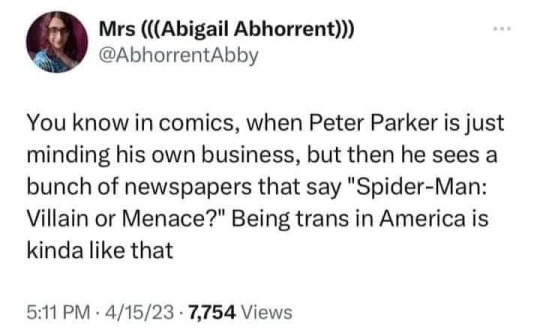
#lgbtq+#gay#lesbian#bisexual#trans#queer#trans men#trans women#non binary#pansexual#asexual#pride#pride month#transgender#transfem#nonbinary#trans joy#trans community#trans beauty
28K notes
·
View notes
Text
(April 12th 2024)
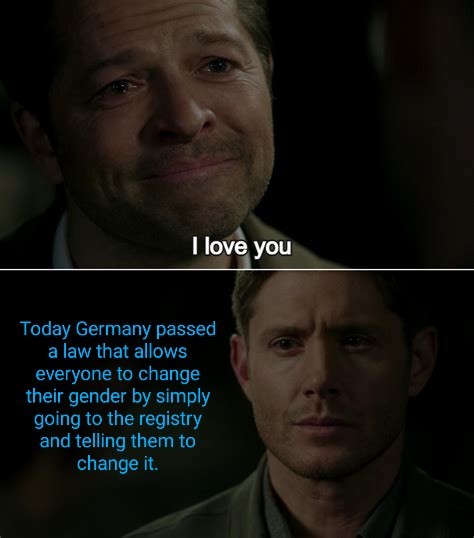
No medical confirmation or psychological evaluation necessary. The law will be active by the 1st of November this year.
First names can also be changed while changing gender. One all inclusive package with minimum effort.
#Selbstbestimmungsgesetz#trans rights#queer rights#destiel news#look its my first destiel meme#germany#name change#self identification#self determination#non-binary rights#name changing rights for everyone#go suck on this terfs
27K notes
·
View notes
Text
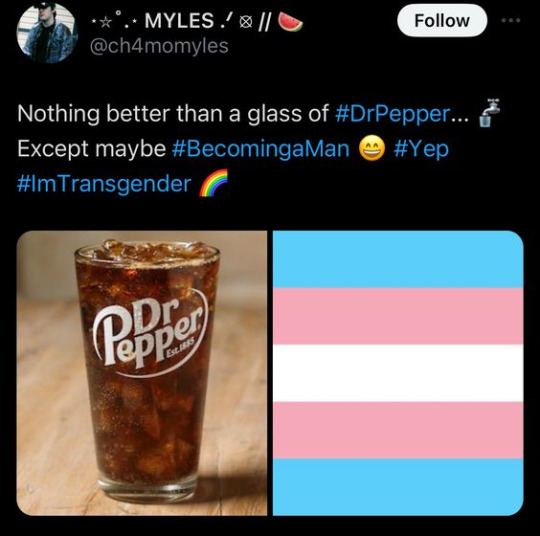
#ftm hypno#trans man#transgender#binary trans#forcemasc#ftm mlm#ftm t4t#trans men#trans memes#transblr
23K notes
·
View notes